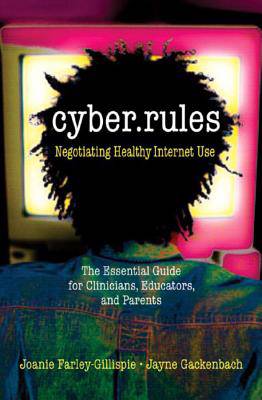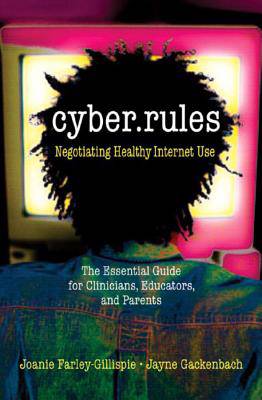
- Retrait gratuit dans votre magasin Club
- 7.000.000 titres dans notre catalogue
- Payer en toute sécurité
- Toujours un magasin près de chez vous
- Retrait gratuit dans votre magasin Club
- 7.000.000 titres dans notre catalogue
- Payer en toute sécurité
- Toujours un magasin près de chez vous
Cyber Rules
What You Really Need to Know about the Internet: The Essential Guide for Clinicians, Educators, and Parents
Joanie Farley-Gillispie, Jayne Gackenbach
Livre broché | Anglais
25,45 €
+ 50 points
Description
Timeless issues such as depression, fear, loneliness, addiction, and sexuality so visible in our everyday lives are being transferred and transformed online. How do today's therapists, parents, and educators negotiate the online and wireless world? We can't assume that traditional theories of human development, learning, and psychology can just be uploaded to cyber space and still be useful. This is especially true when it comes to children and adolescents. They personify what makes the Internet so exciting and confusing: it is young, constantly changing, pushing boundaries, and rejecting the status quo.
Cyber Rules is a practical and comprehensive look at how the Internet is changing us. Making sense of the social, psychological, and global impact of the Internet and its associated technology and media can be overwhelming. Joanie Farley Gillispie and Jayne Gackenbach show you how to make sense of it for yourself and those you love. Filled with sound research, personal stories, creative exercises, and advice, Cyber Rules is one way to get it about the Internet.
Gillispie and Gackenbach begin the book by discussing how Internet communication affects identity. The Internet presents a broad range of new definitions that challenge traditional ways of thinking about how we see ourselves. Chat lines, discussion boards, and role-playing games present opportunities to try on alternate selves and craft a personality (or many different personas). What does all this mean in terms of identity formation and development, especially in regards to children? The Internet facilitates both connection and disconnection, increased attention and impulsivity. How children are actually using media is explained, along with effective discipline methods as it relates to children's media use.
Next, the authors take the reader into the world of online relationships. The unique characteristics and challenges of finding love and establishing relationships online are presented. Cyber sex is considered as both a purely online phenomenon, and as an extension of offline sexuality, particularly in relation to adolescents and their developing sexuality. Video games, which facilitate a new kind of online relationships among gamers, are examined. The authors also explore health online, focusing on how to find the most accurate health information online and appropriate psychological treatment in cyberspace.
Cyber Rules is intended for use by clinicians, educators, and parents, as all three of these groups grapple with cyber issues. It is packed with practical advice, as well as quizzes and exercises that let the reader absorb and apply what has been learned. Readers are encouraged to solve the cyber problems presented in clinical vignettes by imagining themselves as the clinician, educator, or parent who must decide whether the cyber behavior under discussion is healthy, and why. Questionnaires assess knowledge and measure use patterns, while personal stories offer examples of real-life applications of the theoretical issues discussed. Interactive exercises require the reader to conceptualize ways to organize thinking about what's happening online, while testing knowledge of and challenging assumptions about cyber space.
For those who want and need to understand the power of today's Internet culture, Cyber Rules is essential reading.
Cyber Rules is a practical and comprehensive look at how the Internet is changing us. Making sense of the social, psychological, and global impact of the Internet and its associated technology and media can be overwhelming. Joanie Farley Gillispie and Jayne Gackenbach show you how to make sense of it for yourself and those you love. Filled with sound research, personal stories, creative exercises, and advice, Cyber Rules is one way to get it about the Internet.
Gillispie and Gackenbach begin the book by discussing how Internet communication affects identity. The Internet presents a broad range of new definitions that challenge traditional ways of thinking about how we see ourselves. Chat lines, discussion boards, and role-playing games present opportunities to try on alternate selves and craft a personality (or many different personas). What does all this mean in terms of identity formation and development, especially in regards to children? The Internet facilitates both connection and disconnection, increased attention and impulsivity. How children are actually using media is explained, along with effective discipline methods as it relates to children's media use.
Next, the authors take the reader into the world of online relationships. The unique characteristics and challenges of finding love and establishing relationships online are presented. Cyber sex is considered as both a purely online phenomenon, and as an extension of offline sexuality, particularly in relation to adolescents and their developing sexuality. Video games, which facilitate a new kind of online relationships among gamers, are examined. The authors also explore health online, focusing on how to find the most accurate health information online and appropriate psychological treatment in cyberspace.
Cyber Rules is intended for use by clinicians, educators, and parents, as all three of these groups grapple with cyber issues. It is packed with practical advice, as well as quizzes and exercises that let the reader absorb and apply what has been learned. Readers are encouraged to solve the cyber problems presented in clinical vignettes by imagining themselves as the clinician, educator, or parent who must decide whether the cyber behavior under discussion is healthy, and why. Questionnaires assess knowledge and measure use patterns, while personal stories offer examples of real-life applications of the theoretical issues discussed. Interactive exercises require the reader to conceptualize ways to organize thinking about what's happening online, while testing knowledge of and challenging assumptions about cyber space.
For those who want and need to understand the power of today's Internet culture, Cyber Rules is essential reading.
Spécifications
Parties prenantes
- Auteur(s) :
- Editeur:
Contenu
- Nombre de pages :
- 272
- Langue:
- Anglais
Caractéristiques
- EAN:
- 9780393704846
- Date de parution :
- 01-01-07
- Format:
- Livre broché
- Format numérique:
- Trade paperback (VS)
- Dimensions :
- 156 mm x 235 mm
- Poids :
- 408 g







